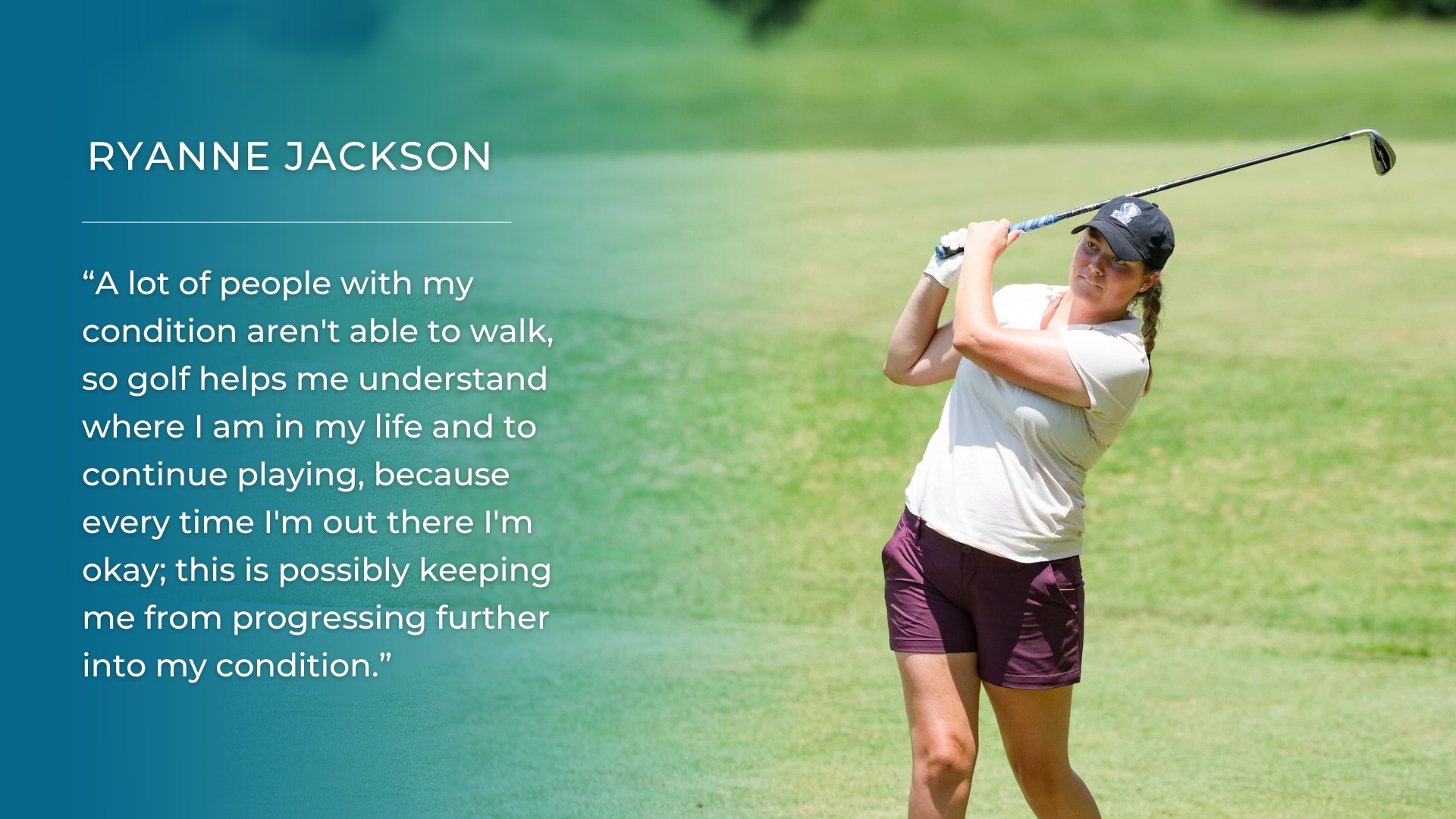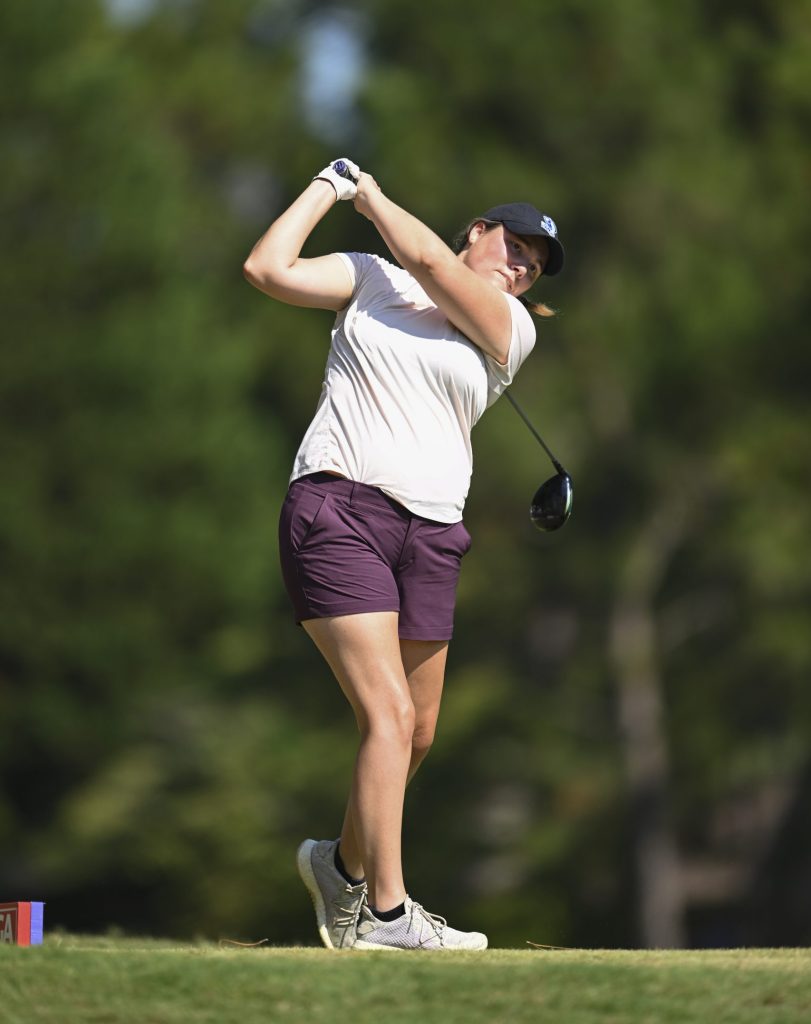
Ryanne Jackson lives in St Petersburg in Florida and loves golf. The 26-year-old is a current US national golf champion. Her father, ‘DJ’, is the local high school golf coach. DJ often describes the bad shots or big mistakes all golfers make as potential ‘round ruiners’; how a moment’s lack of focus can turn a good start on a hole into a scorecard wrecking hefty number. But he also insists that in golf, as in most of life, whatever happens to you there is the chance to come back the next day and perhaps have your best day yet. Of course, you will know that there are round ruiners in every part of our lives, but it is how you react and what you do next which is important. To make an improvement the next time, DJ says, you need to back yourself.
Trusting her own judgement helps Ryanne in dealing with her condition, muscular dystrophy: knowing when she can work, play, practise and, importantly, rest; how to manage her working life at St. Anthony’s Hospital in St. Petersburg, where she works as a patient support technician and is thinking over her potential next steps in this field. Her muscular dystrophy means that the muscles in her shoulders and legs are weakening over time. Ryanne needs to take this seriously, be positive in each aspect of her life, but not to overreach physically.
Although she can’t play as often as she would like to because she needs good rest, she practises and plays ‘smart’ (ie, thoughtfully), and has found a healthy mindset for playing her best golf. This all crystallised in July last year, when entering her nation’s US Adaptive Open for the second time. Feeling unprepared and nervous, she phoned a friend thinking briefly of taking ‘flight’ rather than staying to ‘fight’, before choosing the latter at the challenging Pinehurst No: 6 course in North Carolina, then going on to beat the field by five clear shots with her rounds of 76, 75 and 74. Ryanne was now a US national champion – a well-earned accolade she was able to celebrate with all her family.
Both her Mum Laurie who is a school teacher and her Dad have been “incredibly supportive” in her growing up, but DJ has been the central figure in her golf development. When not doing the day job in real estate, he enjoys his coaching and is clearly good at it. Before helping Ryanne, DJ had coached her sisters Danielle, who is 10 years her senior, and Morgan, eight, to become very fine players themselves.
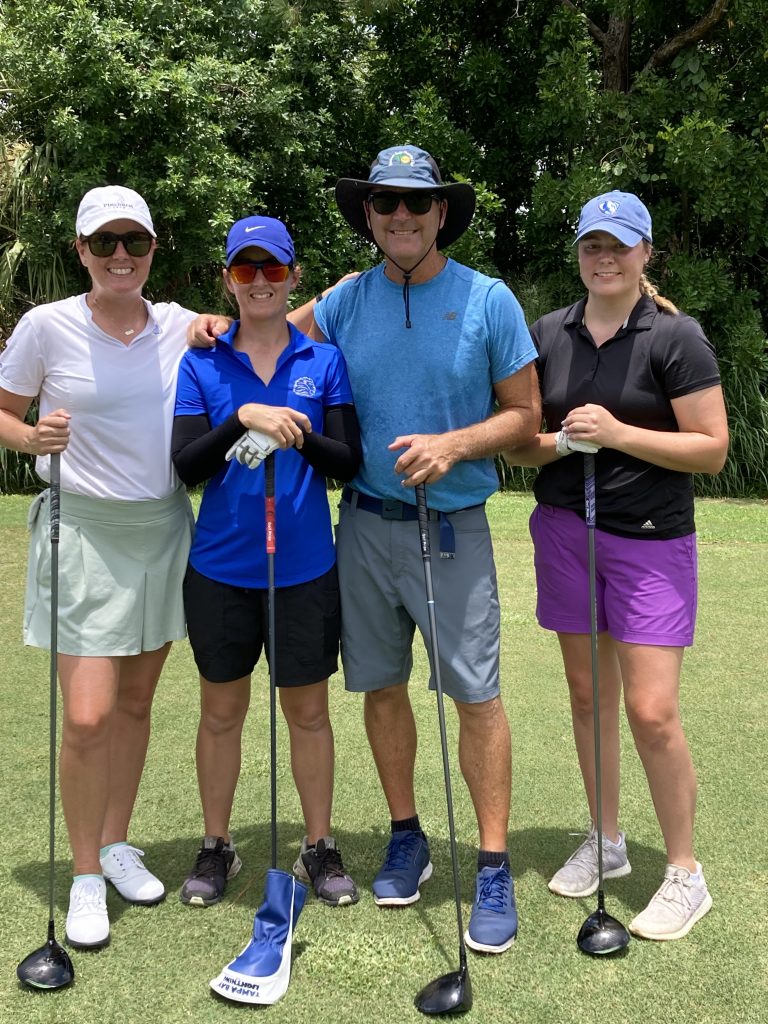
An easy laugh and wide smile are there when Ryanne recounts the story of informing her slightly frustrated father that she was choosing to play golf left-handed, rather than relying on her stronger right hand which she used in day-to-day life. Nothing wrong with that you might say but DJ had coached the elder sisters well to surely prove his credentials, and there was also the small matter of there being lots of right-handed clubs handed down from the girls that were waiting for her in the garage. And after all, Ryanne was only six years-old he reasoned, a bit young to be making major swing decisions based partly because she liked a little putter with which she could putt ‘backhand’. However, Ryanne’s wishes prevailed and she never looked back as a confirmed ‘lefty’ for life.
Meanwhile, when it was time for middle school, the two elder Jackson sisters’ names were already on the honours boards for both golf and basketball. Seeing their names up there inspired Ryanne to push herself forwards on a journey that led to a golf scholarship to Eastern Illinois University.
“I would walk into the gym every day and look up at the basketball and golf record boards and see their names, and no one’s going to know there’s a third Jackson if my name isn’t up there too,” recalls Ryanne. “It was always a goal to follow in their shoes. To be able to go back to where I graduated and see my name with my sisters there is one of the things I’m most proud of.
“Today, I think a lot of my enjoyment from golf comes from being able to do it with my family. With our jobs, we are not able to get together as a family as often, so we have our one time a year that we can all get together and play golf; just having that as a connecting factor is really good for us.”
These family matches usually take place at Seminole Lake Country Club, where she began learning as a six-year-old. All the family are members; Ryanne works four hours a week helping out, and her Dad is often there to keep an eye on her game.
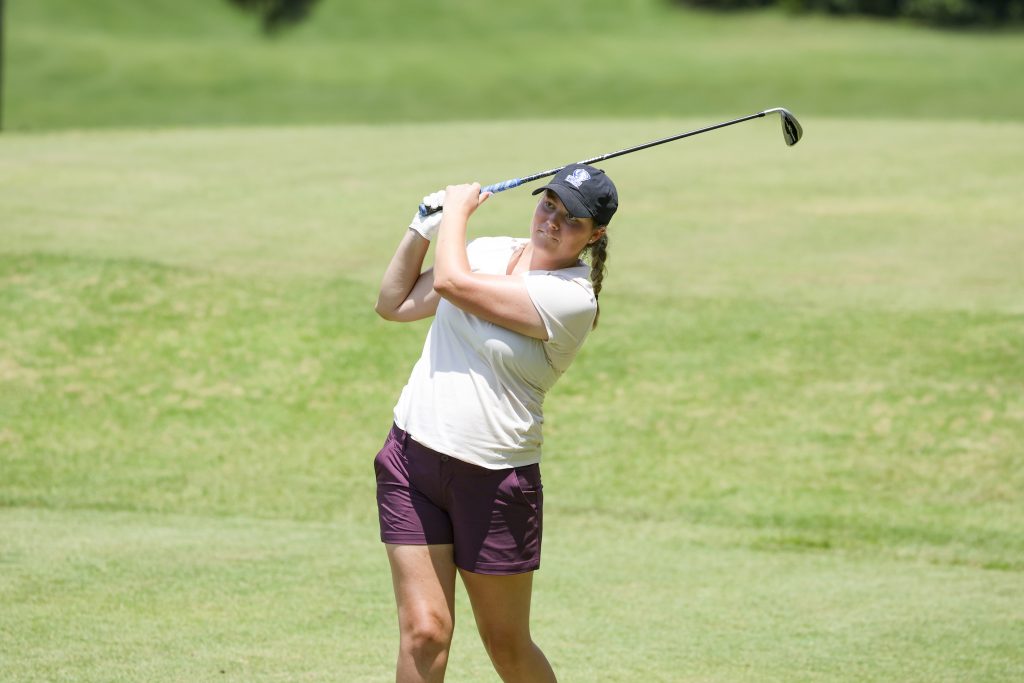
“My Dad used to say that golf is one of the hardest sports he ever tried because in basketball you can miss a three-pointer, but you have the same opportunity the next time you are down the court. For golf you can hit one bad shot, and he calls them ‘round ruiners’.
“But he also says one round doesn’t make a career. Just because you have a round ruiner one time doesn’t mean that the next time it can’t be completely different and you then go out and shoot the best score of your life.”
Ryanne believes a lot of her personality comes from her Dad, including some inner steel because Coach DJ wasn’t afraid to give out some tough love at times. A favourite family story is when she and her high school teammates hadn’t played well that day. DJ temporarily relegated the team name of ‘The Mustangs’ to that of ‘The Ponies’; this inspired the girls to work extra hard to earn back their Mustang title as quickly as possible. Who wants to be a pony when you can be a mustang?
Ryanne loved university golf at Eastern Illinois while she studied history, and she enjoyed the whole team ethic from these experiences. Through hard work, and despite often feeling exhausted and not knowing why, she had improved to become a good single figure golf handicapper and earned a golf scholarship. But there had been a struggle fitness-wise. On the basketball court in her late teens, on the golf course in early college, in school lessons and in the day-to-day, Ryanne started to lose her energy, fatigue became ever-present.
“I was a freshman in college when it was finally diagnosed, while it started in high school playing basketball. A lot of people just saw me as lazy but that was my hundred per cent, or at least my way of conserving energy to be able to play a whole game. It wasn’t until I went to college and realised I was really struggling to walk the golf course or play consecutive rounds, and my teammates were saying I didn’t want to be there, that I wasn’t trying, and that was just never the case with me.
“A lot of people had said, you’re only getting to play basketball because your Dad is the coach. You’re never going to be able to sign a golf scholarship, you’re not good enough. Then realising I did all of these things, plus I had a disability and had no idea, it definitely made me think, wow, I was actually very successful.”
One medical specialist examined how hard some of her shoulder and leg muscles had to work even in low level activity, and compared the effort with that of running a marathon.
“A lot of people with my condition aren’t able to walk, so golf helps me understand where I am in my life, and to continue playing, because every time I’m out there I’m okay; this is possibly keeping me from progressing further into my condition. I have no idea where I’m going to be in 10 years, what I’m going to be able to do, but I think as I continue to play golf today, it is helping me prevent the progression of my disease.”
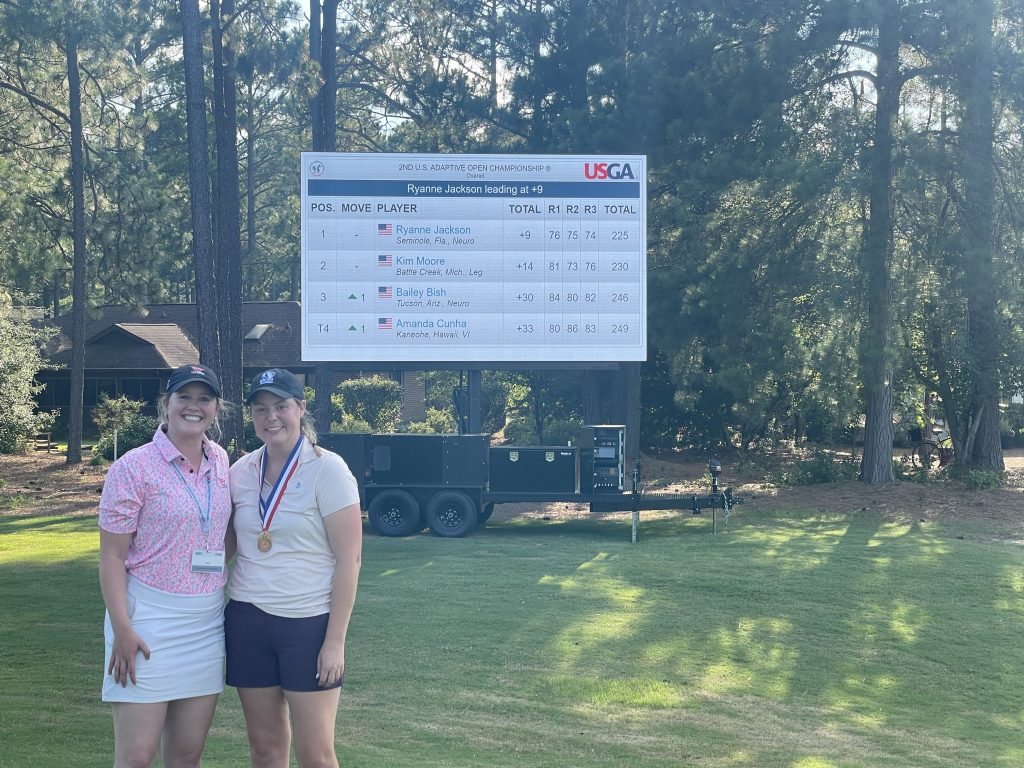
Questioned on the value of golf for other people with impairments and Ryanne doesn’t hesitate in her answer.
“I would definitely recommend golf, it is a sport that everyone can play, especially going to these adaptive [golf for the disabled] events. People who were born with these disabilities and picked up golf along the way; I’ve seen people who played golf and then were in some sort of accident and then continued to enjoy it. People like me who were living with a disability and didn’t know, and got the news later in life, and kept playing golf… And the cool thing about golf is you can play against anyone. It’s not a physical sport where you’re trying to wrestle someone to the ground. You’re truly able to play on your own, but also with other people. It’s just a great game.”
Remembering her positive experiences playing college golf, in 2022 Ryanne discovered the inaugural US Adaptive Open was to be staged at the famous Pinehurst venue, the event created by the United States Golf Association (USGA) for golfers with disability. She didn’t play that well this first time but she enjoyed the experience and signed up to play in 2023, although she did not for a minute think she would lift the trophy at the tournament’s end.
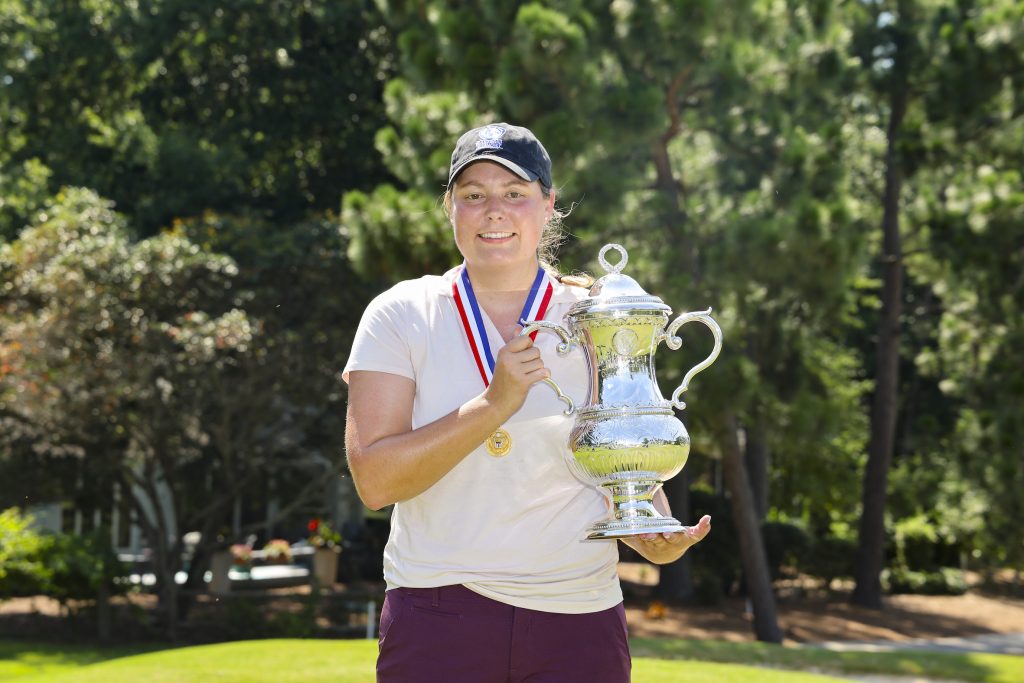
“I did not expect to win. I remember the night before the first round I tried calling one of my friends back in Florida, and luckily he didn’t answer, but I remember the phone ringing and just wanting to say I’m so sorry, I’m going to embarrass myself this year. I don’t feel prepared. And then somehow I just went out and shot three of the better rounds of my career and won!
“After winning, I thought, wow, this is something that I actually enjoy doing. I was able to play three more tournaments last summer and those all helped, in Ohio, Georgia, and then Florida. This year I’ve tried to add on a few extra tournaments just to be able to play because I love seeing new places. I feel like I’ve made friends now when I go to tournaments, I love playing and hanging out with new friends.”
Ryanne will now have the opportunity of defending her US Adaptive Open crown this July, with the tournament in its third edition being staged at Sand Creek Station Golf Club near Wichita, Kansas. Here she will play against some of the best golfers with disability on this challenging course.
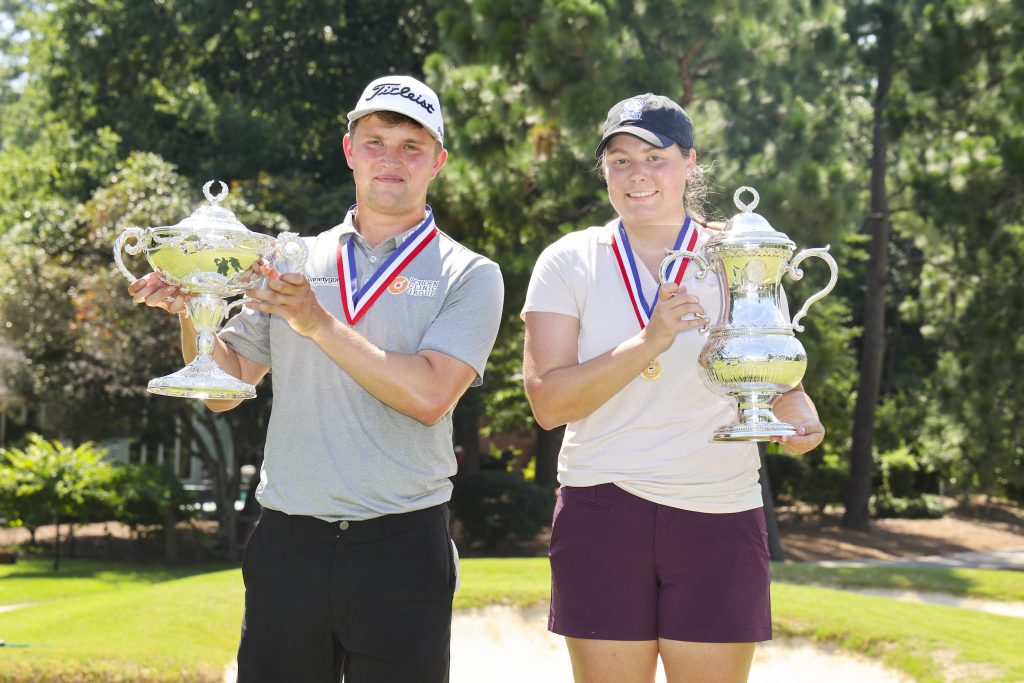
Winning the event earned Ryanne some healthy points on the World Ranking for Golfers with Disability, and she has recently qualified for the G4D Tour for the first time, the high-profile international tournament series staged by the DP World Tour and EDGA, contested by the leading world ranked G4D (golf for the disabled) players and taking place at top golf venues as far afield as the UK, Australia, Singapore, Spain, Germany, Ireland, Sweden, Kenya, the United Arab Emirates and – come the end of April – Ryanne will find herself teeing it up in the G4D Tour @ CJ Cup Byron Nelson in Texas in a field of players with different impairments, playing on the same course – TPC Craig Ranch – in the same week, as the famous US PGA Tour professionals we see on TV.
Ryanne says: “I’m very much looking forward to this opportunity, meeting the players in Texas who are the best of the best, it’s a very exciting prospect.” She will be joined again in Texas by her friend and caddie McKenzie, who is a former teammate from Eastern Illinois University, and was her caddie for the US Adaptive Open complete with carrying Ryanne’s Eastern Illinois team golf bag. The pair will no doubt make a great combination for the tournament.
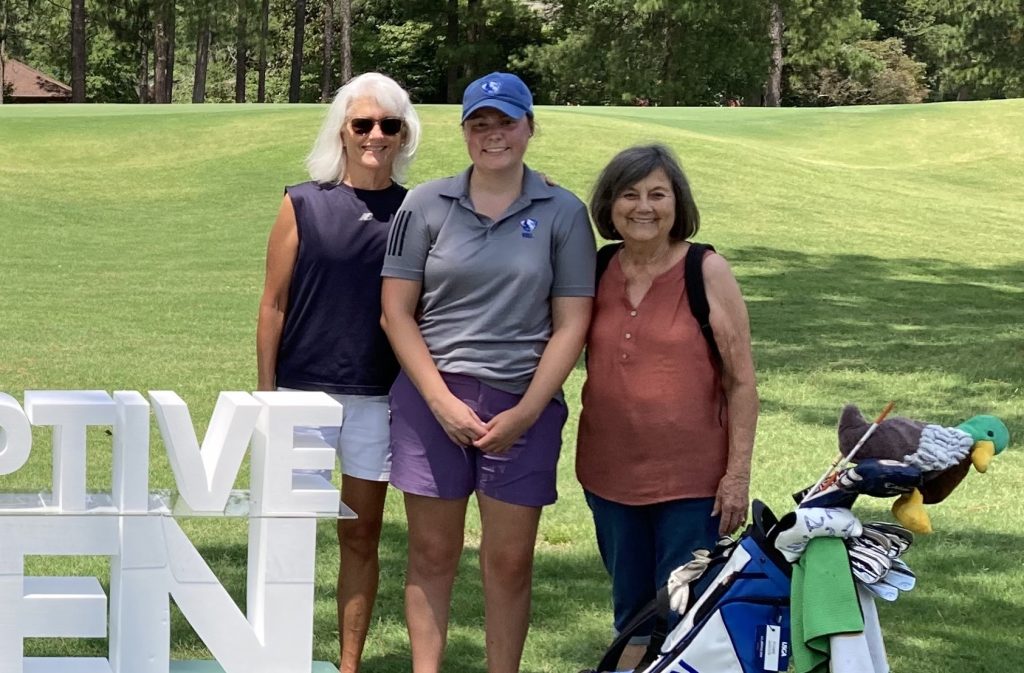
It is probably high time that Ryanne gave herself a pat on the back for her achievements. She practises smart, which she hopes also translates to good course management in tournaments; this learned with help from her elder sisters at Seminole Lake, and the subject brings her back to the person she thanks most for her golfing mindset.
“I think my Dad DJ has always been my greatest supporter through golf and my biggest cheerleader. When I was going through the process of getting diagnosed, my Dad was the one who when everyone was saying she’s just lazy, give up on her, he was saying, no, I think there’s actually something going on here. My Mom, obviously she hasn’t been able to come and support me at as many tournaments in person as she would like because she’s a school teacher, but she was able to be there at the US Adaptive Open when I won, which was just a great moment to be able to share with her.
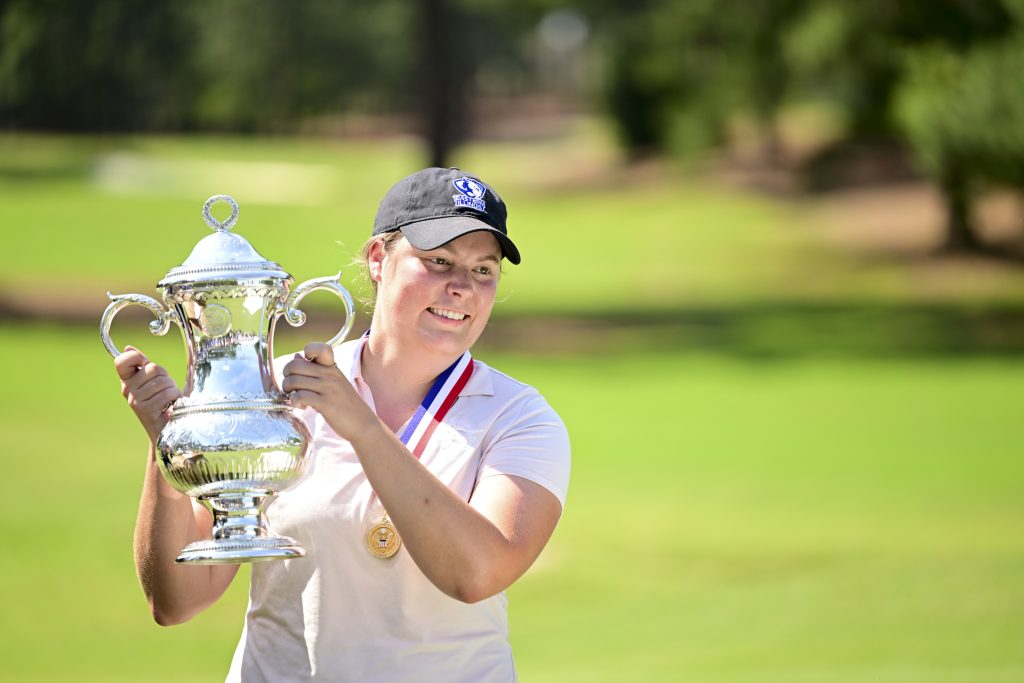
“Then I would add thanks to my college coaches who were in the struggle with me of figuring out what was going on. I had to petition for the use of a golf cart because I couldn’t walk the course and carry my bag. I had a few college coaches who really stood by me, and I’m always grateful for them for just giving me a chance.”
Ryanne might have practised less than the rest of the field when she arrives soon on the first tee for the G4D Tour in Texas, but that doesn’t mean she will be the least prepared. She has DJ’s wisdom (even though she didn’t follow that to play right-handed of course), and she has a decade of playing golf to a very high standard. And, successfully managing her medical condition while still loving her sport, no player understands their own capabilities better than Ryanne. She also knows that while the odd round ruiner can affect anyone, it’s how you come back the next day that really matters. If that’s Ryanne and DJ’s secret, it’s certainly one worth sharing.
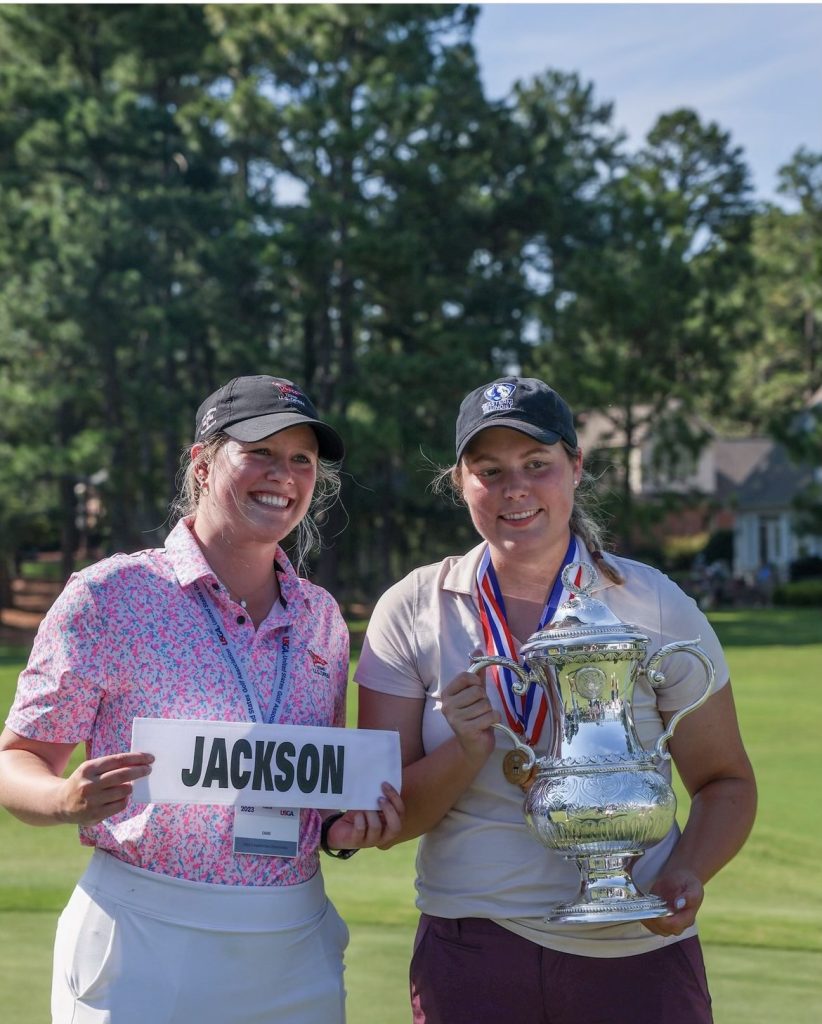
NB: When using any EDGA media, please comply with our copyright conditions


